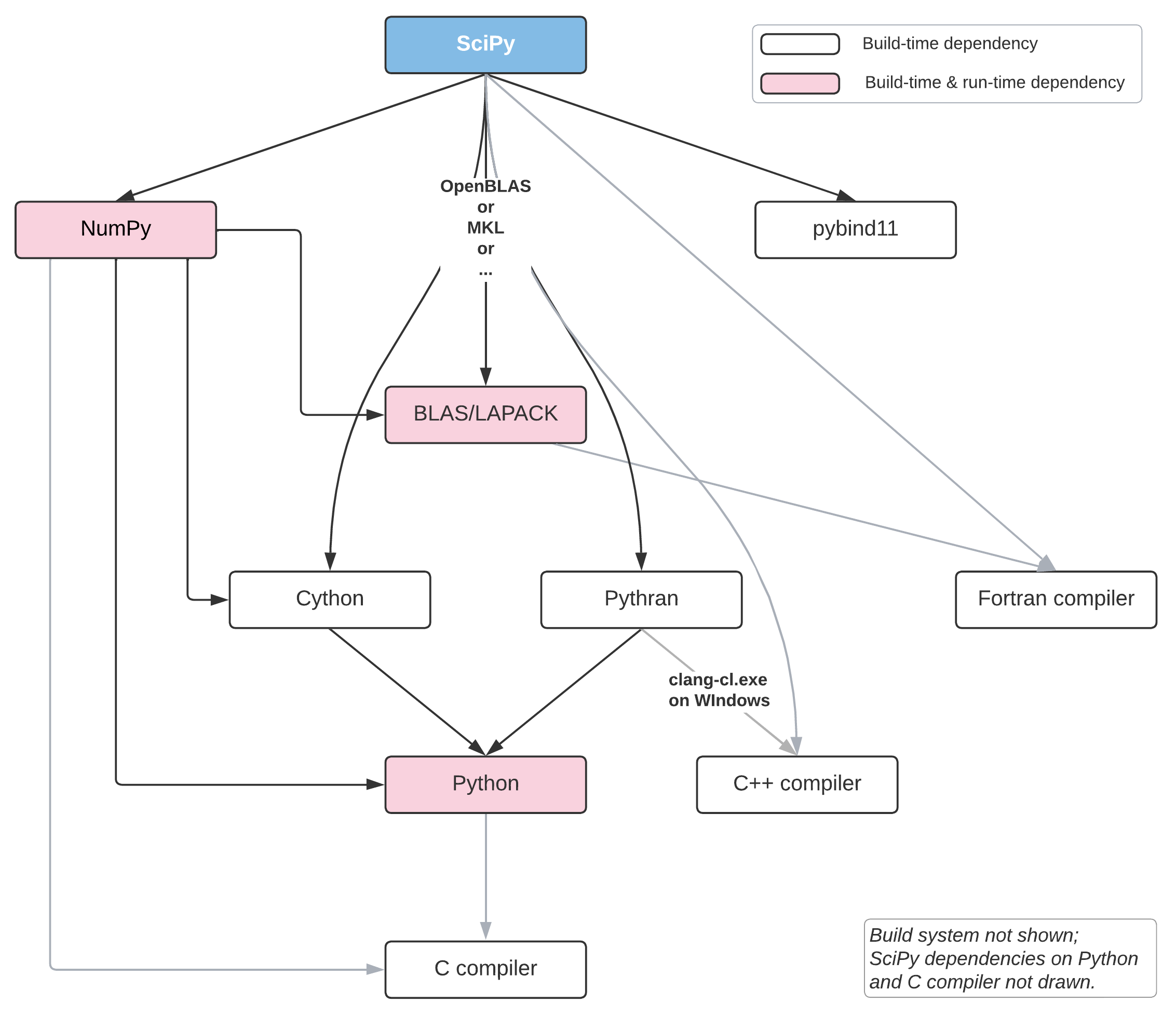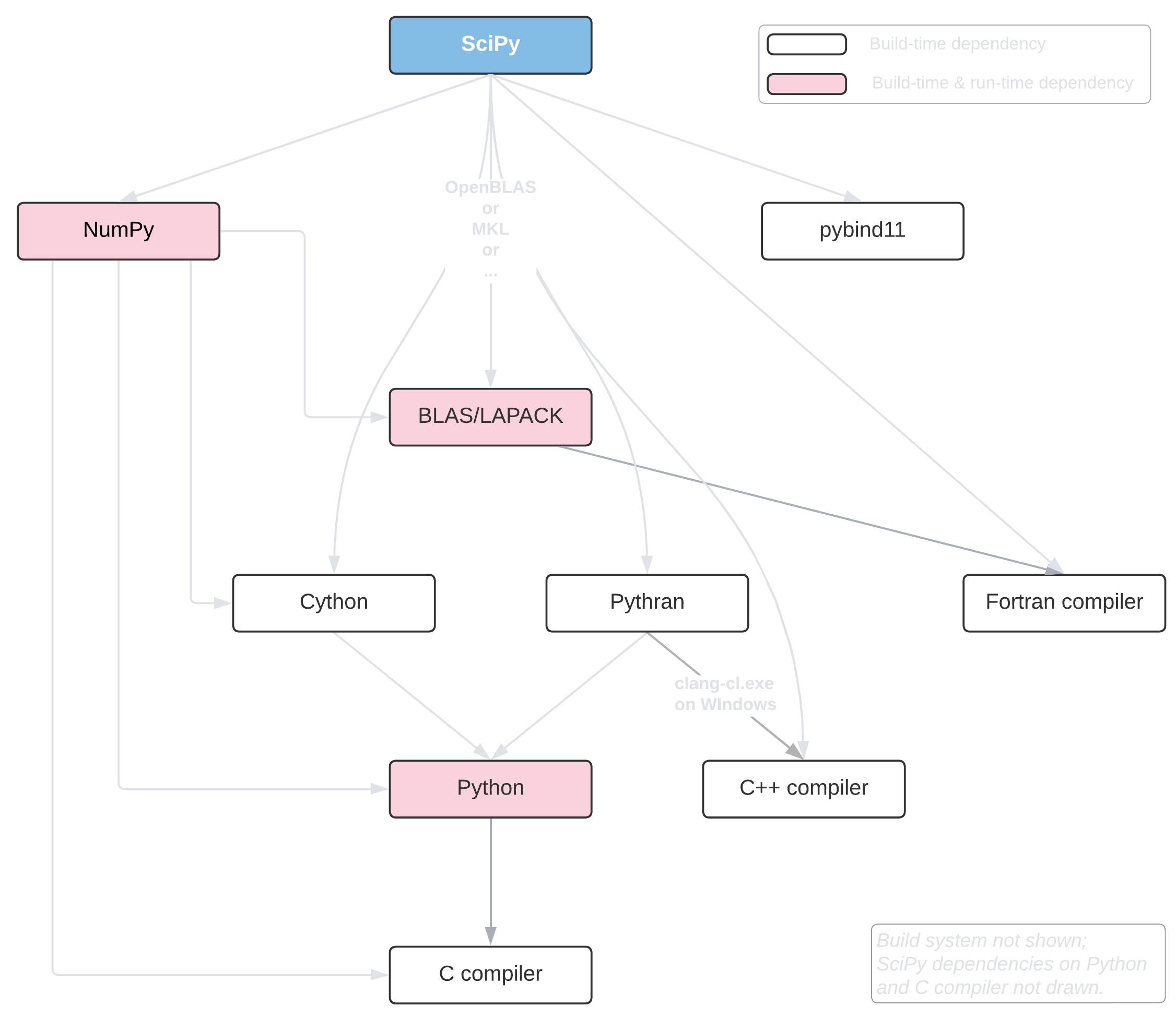Native dependencies
Depending on non-Python compiled dependencies ("native dependencies") is very tricky. Python packaging works reasonably well when a project contains some self-contained C, C++ or Cython code. Even then, issues can occur though - for example because the dependency on a C or C++ compiler cannot be expressed in package metadata. So any constraints on versions, compiler types, etc. can only be documented and not enforced1.
C, C++ and Cython are not the only languages that need native dependencies - Fortran, CUDA, and Rust are other commonly used languages, and there are more languages that one may want to use (e.g., in the context of scientific computing and GPUs, OpenCL, HIP and SYCL are of increasing interest).
Once such code starts to depend on APIs from non-Python projects, more problems show up.
Current state
One obvious and hard to deal with problem is that dependencies on libraries
that are not on PyPI cannot be expressed. When one types pip install somepkg
for a somepkg that has such dependencies on a platform that somepkg doesn't
provide wheels for, what is most likely to happen is a build failure halfway
through because a dependency is missing or is present but in an unexpected
configuration.
Example: SciPy's build and runtime dependencies
SciPy has a few build-time dependencies and one runtime dependency
(numpy) listed in its pyproject.toml. As a package with medium build
complexity (more complex than projects with self-contained C/Cython
extensions, but less than the likes of TensorFlow and PyArrow), it can
serve as an example of what metadata can and cannot capture about
dependencies. This diagram illustrates those dependencies:


Out of those, these are the dependencies declared in pyproject.toml:
numpy, Cython, pybind11, and pythran (also the build system
dependencies: meson-python, wheel). And these are the dependencies that
cannot be declared:
- C/C++ compilers
- Fortran compiler
- BLAS and LAPACK libraries
*-devpackages for Python, BLAS and LAPACK, if headers are packaged separately- pkg-config or system CMake (for dependency resolution of BLAS/LAPACK)
Finally, a number of native libraries (Boost, ARPACK, HiGHS, etc.) are vendored into SciPy. Unvendoring those (something system packagers would like) has been deemed infeasible2, those dependencies would also not be expressible and therefore make the build more fragile.
Some projects do upload sdists but advise users to avoid them (or avoid PyPI completely in favor of other package managers). Some other projects do not upload sdists to PyPI to avoid users filing issues about failing builds. See purposes of PyPI for more on this topic.
Building wheels is challenging too. Wheels are required to be self-contained,
and therefore must vendor those non-Python dependencies. This means that a
project becomes responsible for (often) rebuilding the dependency, dealing with
the vendoring process (through auditwheel, delocate, delvewheel, etc. -
and sometimes those tools are not enough), and implementing static linking or
other ways of slimming down wheel sizes when vendoring large libraries. There
may be other issues with vendoring, like EULA's for libraries like CUDA and MKL
being ambiguous or outright forbidding redistribution.
Even when the vendoring hurdle is successfully taken and working wheels are produced, there may be problems because vendoring may be the wrong solution technically. E.g., runtimes are often designed with the assumption that they're the only runtime on a given system - so having multiple vendored copied of a runtime in different packages leads to conflicts.
Native dependencies is a huge topic, so to make the problems more concrete, a number of cases are worked out:
Problems
The key problems are (1) not being able to express dependencies in metadata, and (b) the design of Python packaging and the wheel spec forcing vendoring dependencies.
For more detailed explanations of problems, see the concrete cases linked above.
History
- PEP 426, section "Mapping dependencies to development and distribution activities" (2012, withdrawn).
- PEP 459 - "Standard Metadata Extensions for Python Software Packages" (2013, withdrawn). This is probably the most relevant PEP that has been proposed - it explicitly deals with native dependencies provided by the system.
- Nathaniel Smith's
pynativelibproposal (2016). - PEP 668 - Marking Python base environments as “externally managed” (2021).
More history TODO
Relevant resources
TODO
Potential solutions or mitigations
From the "Wanting a singular packaging tool/vision" Discourse thread (2022):
- Define "native requirements" metadata (even if
pipignores it) - Allow (encourage) wheels with binaries to have tighter dependencies than their sdists
- Encode and expose more information about ABI in package requirements
Adding a mechanism to specify system dependencies that are needed by a Python package seems like a tractable first step here.
- Provide a way for users to get pure Python packages from PyPI, and everything else from a system package manager.
- ... many other potential improvements (all a lot of work).
-
As a simple example, let's use Pythran - a Python to C++ transpiler that is gaining popularity and is used in SciPy and scikit-image. On Windows it needs Clang-cl rather than MSVC. This often goes wrong, because most users don't have Clang-cl installed. ↩
-
With Meson as the new build system for SciPy, it is becoming possible to query the system for dependencies first, and only fall back to a vendored version if the system is not found. This may be done in the future. ↩